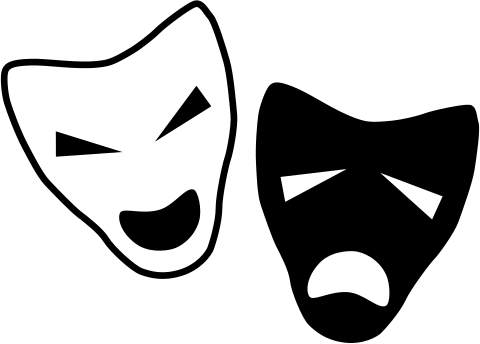Emotions are the fuel for books. It's what keeps a reader engaged in the story, and keeps the story going. Without emotions, a book would only be pages of shallow boredom. This is why it is not only an author's goal, but their duty to line their pages with emotions that their audience can relate to.
Before we get into this post, I'd like you to look at your drafts, your scribbled pages, your notes, and see if your story and your characters display realistic emotions. Look for traces of happiness, sadness, anger, angst, confusion.
What emotions did you go through while writing?
This is a general rule I give to many of the new writers that come to me. If you don't feel anything at all while your writing, not happiness, not anger, not sadness, just neutral contentment, then you know something is wrong. It doesn't matter if you're the toughest dude on the corner; if your story truly means something to you, you will go through a range of emotions while you are writing. You will get mad, pissed off, depressed as hell, happy, and everything that can be felt on the spectrum of emotions.
One day you will say "Oh my god. I can't believe I just killed off Fabio. Now Sally May is going to be all alone for the rest of her life." Then you will be sympathetic for the fictional character you created, and you will go through bouts of sadness and depression. Then, one day, you will find the courage to pick up that pen again and start writing.
Authors go through these phases of emotions because their writing and their characters are very real to them. If you aren't experiencing any emotional attachment or feelings at all in your story, then neither will your audience.
Is there a mix of each?
If your story is too happy, too sad, too angry, your audience will sooner or later get tired of reading your book. Like most things in life, people want an interesting, colorful variety so they are never left bored and intolerant. Create your scenes so that they are believable. No one in life is always happy or sad or mad. We always go through a rollercoaster of emotions, and so should the pages of your book.
Sometimes having a variety of emotions is difficult in a book. To this, I ask my writers the following question:
What does your character want to feel?
Most answers would be: "My character wants to be happy."
Alright, so if your character wants to be happy, how is she going to get there? Are there some obstacles she has to go through, problems she has to deal with? If your character wants to be happy, then that should be their goal and their feeling at the end of their long journey.
Some individuals would give me the dreaded answer: "But my protagonist is already happy."
If you are telling yourself this, then you MUST change something about your novel. Otherwise, you are telling me that your character is emotionally well, and therefore will be unattached to the plot at hand. Odds are, if your protagonist doesn't give a crap, neither will your audience.
Does it flow?
If you're going to have a chapter of someone dying and going through utmost grief, then your next chapter has to be either the same feelings or a transition to something else. Do NOT continue with a happy, sunny-day, everything-is-right-with-the-world scene; the change is just too much and too confusing to handle. It is unrealistic and a major turn-off for many readers.
Does it matter?
For many of the writings I receive, it is quite often the case that there ARE emotions, I just don't feel like I should care about them. For example, if Sally May's story revolves around trying to deal with the death of her mother, then her emotions should revolve around angst, sadness, and perhaps anger. Thus, it would be inappropriate to mention Sally May seeing a couple kissing on the middle of a sidewalk, and her going through a phase of love-angst. Why? Because it just doesn't matter, and it adds irrelevant clutter and confusion to your story.
But, and I stress this immensely, it all depends on your story. If your protagonist wants love and the emotion contributes to the overall plot, then so be it. If finding a new love, perhaps a future husband who helps her deal with her situation, is the solution to her conflicts, then by all means add love to your story. But if love plays no role whatsoever in your story, please just leave it out.
How to put it all together?
That, my fellow readers, is a skill that can only be accomplish through practice, thoughtfulness, and hard-work. I cannot answer that question for you because it is so dependent on your story and your situation. But you will know, deep in your gut, when that time comes. The moment you get that feeling is the moment you know you have created a masterpiece.

Before we get into this post, I'd like you to look at your drafts, your scribbled pages, your notes, and see if your story and your characters display realistic emotions. Look for traces of happiness, sadness, anger, angst, confusion.
What emotions did you go through while writing?
This is a general rule I give to many of the new writers that come to me. If you don't feel anything at all while your writing, not happiness, not anger, not sadness, just neutral contentment, then you know something is wrong. It doesn't matter if you're the toughest dude on the corner; if your story truly means something to you, you will go through a range of emotions while you are writing. You will get mad, pissed off, depressed as hell, happy, and everything that can be felt on the spectrum of emotions.
One day you will say "Oh my god. I can't believe I just killed off Fabio. Now Sally May is going to be all alone for the rest of her life." Then you will be sympathetic for the fictional character you created, and you will go through bouts of sadness and depression. Then, one day, you will find the courage to pick up that pen again and start writing.
Authors go through these phases of emotions because their writing and their characters are very real to them. If you aren't experiencing any emotional attachment or feelings at all in your story, then neither will your audience.
Is there a mix of each?
If your story is too happy, too sad, too angry, your audience will sooner or later get tired of reading your book. Like most things in life, people want an interesting, colorful variety so they are never left bored and intolerant. Create your scenes so that they are believable. No one in life is always happy or sad or mad. We always go through a rollercoaster of emotions, and so should the pages of your book.
Sometimes having a variety of emotions is difficult in a book. To this, I ask my writers the following question:
What does your character want to feel?
Most answers would be: "My character wants to be happy."
Alright, so if your character wants to be happy, how is she going to get there? Are there some obstacles she has to go through, problems she has to deal with? If your character wants to be happy, then that should be their goal and their feeling at the end of their long journey.
Some individuals would give me the dreaded answer: "But my protagonist is already happy."
If you are telling yourself this, then you MUST change something about your novel. Otherwise, you are telling me that your character is emotionally well, and therefore will be unattached to the plot at hand. Odds are, if your protagonist doesn't give a crap, neither will your audience.
Does it flow?
If you're going to have a chapter of someone dying and going through utmost grief, then your next chapter has to be either the same feelings or a transition to something else. Do NOT continue with a happy, sunny-day, everything-is-right-with-the-world scene; the change is just too much and too confusing to handle. It is unrealistic and a major turn-off for many readers.
Does it matter?
For many of the writings I receive, it is quite often the case that there ARE emotions, I just don't feel like I should care about them. For example, if Sally May's story revolves around trying to deal with the death of her mother, then her emotions should revolve around angst, sadness, and perhaps anger. Thus, it would be inappropriate to mention Sally May seeing a couple kissing on the middle of a sidewalk, and her going through a phase of love-angst. Why? Because it just doesn't matter, and it adds irrelevant clutter and confusion to your story.
But, and I stress this immensely, it all depends on your story. If your protagonist wants love and the emotion contributes to the overall plot, then so be it. If finding a new love, perhaps a future husband who helps her deal with her situation, is the solution to her conflicts, then by all means add love to your story. But if love plays no role whatsoever in your story, please just leave it out.
How to put it all together?
That, my fellow readers, is a skill that can only be accomplish through practice, thoughtfulness, and hard-work. I cannot answer that question for you because it is so dependent on your story and your situation. But you will know, deep in your gut, when that time comes. The moment you get that feeling is the moment you know you have created a masterpiece.
May your joy in writing lead you to happiness,
Jay

